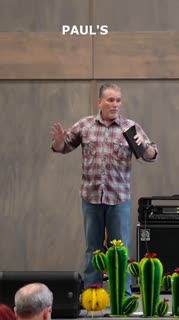Discernment: Guarding Against Spiritual Deception
Devotional
Sermon Summary
Bible Study Guide
Sermon Clips
1. "We're living in a world where scams and fraud are becoming more and more commonplace. You notice that back in the day, you got the email from the Nigerian Prince, and you're like, no, I ain't believing that. But it's gotten more difficult. Scams come from different directions. One of our young guys was saving up money and looking to buy a car, and he was looking. He's doing his due diligence, looking online. He's on Facebook Marketplace, and he finds a car on Facebook Marketplace, and it was a great deal." [00:02:25] (37 seconds)
3. "Paul's the greatest missionary there's ever been, one of the first. He plants churches all over the Mediterranean Sea, or all over the Mediterranean Rim, and he plants one in Corinth, hence the letter to the Corinthians. And there's actually three, we have two in the Bible. He writes these letters back. So he's planted a church, and he's raised up leadership, and then he's, once the church is going pretty good, he goes off to plant another church." [00:10:14] (24 seconds)
6. "Even the devil makes himself look like an angel that comes from God's army. The enemy. The enemy does a good job of disguising things to make awful things look palatable. That's what he does. It's how he does it. He's in the business of imitating. The enemy has always taken good things, tried to imitate it and skew it a little bit." [00:22:36] (28 seconds)
Ask a question about this sermon
3. "Paul's the greatest missionary there's ever been, one of the first. He plants churches all over the Mediterranean Sea, or all over the Mediterranean Rim, and he plants one in Corinth, hence the letter to the Corinthians. And there's actually three, we have two in the Bible. He writes these letters back. So he's planted a church, and he's raised up leadership, and then he's, once the church is going pretty good, he goes off to plant another church." [00:10:14] (24 seconds)
6. "Even the devil makes himself look like an angel that comes from God's army. The enemy. The enemy does a good job of disguising things to make awful things look palatable. That's what he does. It's how he does it. He's in the business of imitating. The enemy has always taken good things, tried to imitate it and skew it a little bit." [00:22:36] (28 seconds)



